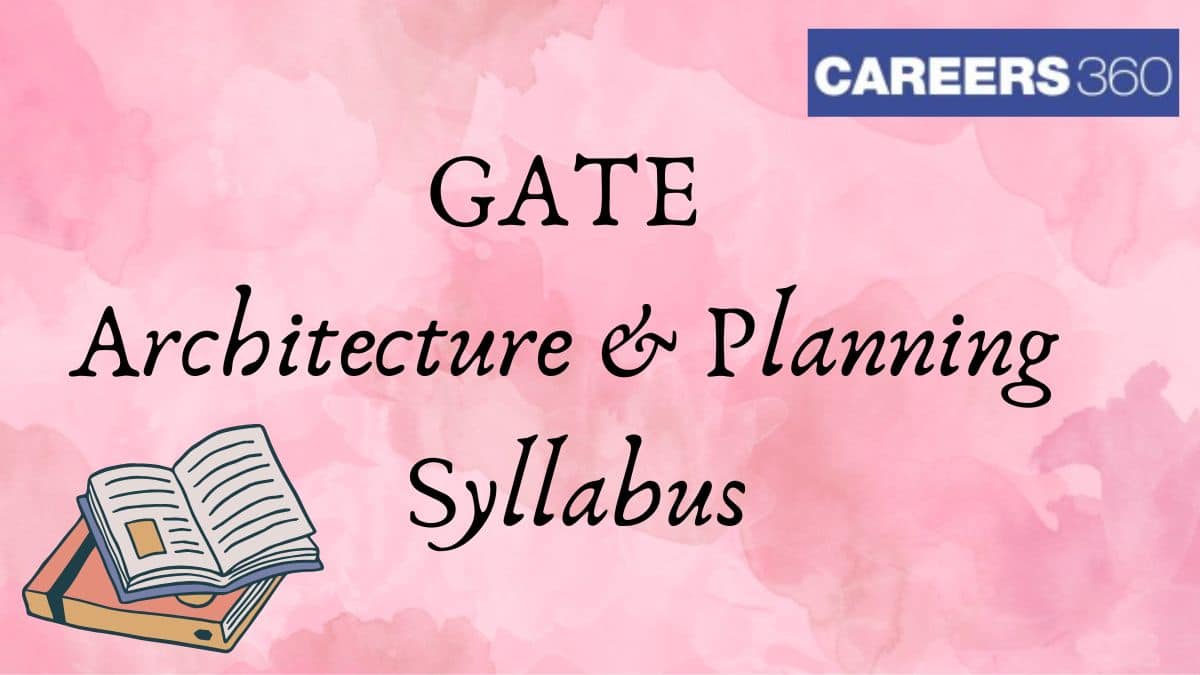UPES M.Tech Admissions 2026
Ranked #45 Among Universities in India by NIRF | 1950+ Students Placed 91% Placement, 800+ Recruiters
GATE 2026 Syllabus for Architecture and Planning (AR) - IIT Guwahati has published the GATE Architecture and Planning syllabus on the official website, gate2026.iitg.ac.in. Candidates can check the GATE 2026 syllabus for Architecture and Planning here in this article. The GATE 2026 syllabus usually consist of the topics on which the questions will be framed in the exam. Applicants must download and prepare according to the GATE Architecture and Planning syllabus to ensure they cover all important topics. The authority will conduct the GATE 2026 exam for Architecture and Planning in online mode. The GATE entrance exam will be held on February 7, 8, 14 and 15, 2026. The authority will conduct the GATE AR exam on February 15, 2026.
Direct link to download the GATE 2026 syllabus for Architecture and Planning

The GATE Architecture and Planning Engineering syllabus 2026 includes Architecture, Planning, and Design, Construction & Management, Building & Structures, Environmental Planning & Design, Urban Design, Landscape & Conservation, Urban Planning & Housing, Planning Techniques & Management, and Services. Candidates can also check the GATE exam pattern 2026 along with the GATE AR syllabus. Candidates must begin their GATE exam preparation as early as possible because the topics covered in the syllabus are quite vast. The GATE architecture syllabus pdf 2026 is divided into eight sections. The questions asked in the GATE question paper will be asked from these eight sections only. Candidates should download the GATE Agricultural Engineering syllabus online. Read the article for the GATE 2026 AR syllabus, the best books as per the GATE syllabus 2026 for Architecture and Planning and the exam pattern.
Indian Institute of Technology, Guwahati has released the GATE 2026 Architecture & Planning syllabus on the official website. The GATE syllabus for Architecture & Planning 2026 helps candidates know the important topics to study. With the help of the GATE 2026 Architecture syllabus, candidates can figure out which study material to choose for the preparation. Below are the chapters included in the GATE 2026 AR syllabus.
Candidates can check the GATE syllabus for General Aptitude (GA) below. The syllabus s based on the previous year notification.
| Chapters | Topics |
|---|---|
| GATE AR syllabus for Verbal Aptitude |
|
| GATE AR syllabus for Quantitative Aptitude |
|
| GATE AR syllabus for Analytical Aptitude |
|
| GATE AR syllabus for Spatial Aptitude |
|
The GATE AR syllabus included seven common topics. The common topics for GATE Architecture & Planning are Architecture, Planning and Design, Construction and Management, Environmental Planning and Design, Urban Design, Landscape and Conservation, Planning process, Housing, Services and Infrastructure. Below is a detailed syllabus for GATE AR 2026.
| Sections | Topics |
|---|---|
| GATE AR Syllabus for Architecture, Planning and Design |
|
| GATE AR Syllabus for Construction and Management |
|
| GATE AR Syllabus for Environmental Planning and Design |
|
| GATE AR Syllabus for Urban Design, Landscape and Conservation |
|
| GATE AR Syllabus for Planning process |
|
| GATE AR Syllabus for Housing |
|
| GATE AR Syllabus for Services and Infrastructure |
|
| Chapter | Topics |
|---|---|
| GATE Architecture syllabus for History and Contemporary Architecture |
|
| GATE Architecture syllabus for Building Construction and Structural systems |
|
| GATE Architecture syllabus for Building Services and Sustainability |
|
| Chapter | Topics |
|---|---|
| GATE Planning syllabus for Regional and Settlement Planning |
|
| GATE Planning syllabus for Planning Techniques and Management |
|
| GATE Planning syllabus for Infrastructure Planning |
|
Frequently Asked Questions (FAQs)
Candidates can download the GATE 2026 Architecture syllabus pdf on the official GATE website or directly from this page.
IIT Guwahati has released the GATE syllabus 2026 on the official website.
To prepare for the GATE Architecture exam candidates need to be aware of the syllabus and exam pattern. Moreover, candidates should plan their preparation in such a way that they cover the entire syllabus. Candidates should also practice mock tests and solve the previous year's question for self-assessment.
GATE 2026 official website is gate2026.iitg.ac.in
Some of the important topics for GATE Architecture include Principles of Art and Architecture, Environmental planning and design and housing.
On Question asked by student community
The cutoff marks for OBC category students are different for different paper codes. You can check the article on Gate cutoff for all the detailed information. Hope it helps.
IIT Guwahati has released GATE exam ME answer key in online mode. Here we have provided direct link to download IIT Guwahati Mechanical Engineering answer key.- Download Here
The official GATE 2026 Shift 2 (Feb 8) answer key was released by IIT Guwahati on February 22, 2026, on the GOAPS portal.
Check out the GATE 2026 February 8 Question Paper with Solutions .
Hi Raj, please check the link for GATE Agricultural Engineering question paper 2026 to know about the syllabus and the topic covered.
Hi Uma,
You can download GATE 2026 February 8 question paper with solutions by clicking on the link below:
Among top 100 Universities Globally in the Times Higher Education (THE) Interdisciplinary Science Rankings 2026
NAAC A+ Accredited | Among top 2% Universities Globally (QS World University Rankings 2026)
Ranked #45 Among Universities in India by NIRF | 1950+ Students Placed 91% Placement, 800+ Recruiters
NAAC A+ Accredited | Scholarships worth 5 CR
1st in NPTEL program of 6 IITs | Highest CTC 72 LPA | Scholarships to meritorious students
Asia’s only university to be awarded the highest accreditation by WASC, USA and by the Quality Assurance Agency for Higher Education (QAA), UK